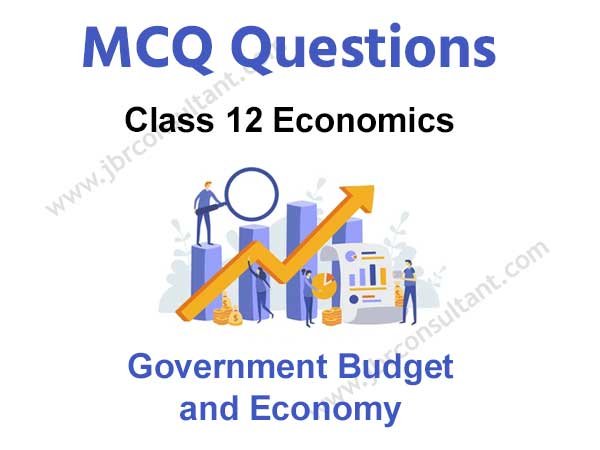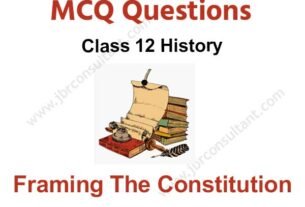Government Budget and the Economy Class 12 MCQ Class 12 MCQ is one of the best strategies to prepare for the CBSE Class 12 Board exam. If you want to complete a grasp concept or work on one’s score, there is no method except constant practice. Students can improve their speed and accuracy by doing more MCQ on Government Budget and the Economy Class 12 with Answers which will help them all through their board test.
Government Budget and Economy Class 12 MCQ Questions with Answers
Class 12 Economics MCQ with answers are given here for Chapter 11 Government Budget and Economy. These MCQs are based on the latest CBSE board syllabus and relate to the latest Class 12 Economics syllabus. By Solving these Class 12 MCQs, you will be able to analyze all of the concepts quickly in the chapter and get ready for the Class 12 Annual exam.
Learn Class 12 Government Budget and the Economy MCQ PDF with Answers according to the latest CBSE and NCERT syllabus. Students should prepare for the examination by solving the CBSE Government Budget and the Economy Class 12 MCQ with answers given below.
1. Which of the following are the objectives of government budget?
(a) Redistribution of income wealth
(b) Economic stability
( c) GDP growth
(d) all of these
Answer
D
2. Which of the following is a non-tax receipt?
(a) Gift tax
(b) sales tax
(c) donations
(d) Excise duty
Answer
C
- 3. In the context of government budget, which of the following statements is correct?
(a) Budget is a statement of expected annual receipts and expenditures of the government
(b) It is the detail of actual receipts and expenditures of the government in a financial year
(c) It offers a detailed description of achievements of the government during the five year plans
(d) It indicates BoP status of the domestic economy
Answer
A
4. A tax, the burden of which can be shifted to others, is called:
(a) Indirect tax
(b) direct tax
(c) wealth tax
(d) none of these
Answer
A
5. Progressive tax is a tax which is :
(a) Charged at a decreasing rate when income of the individual increases
(b) Charged at a increasing rate when income of the individual increases
(c) A fixed percentage of an individual income
(d) None of these
Answer
B
6. Regressive tax is a tax which is :
(a)Charged at a increasing rate when income of the individual increases
(b)Charged at a decreasing rate when income of the individual increases
(c)Relatively a low percentage of an individual’s income
(d)None of these
Answer
B
7. Which of the following is an indirect tax?
(a) Wealth tax
(b) Excise tax
(c) income tax
(d) none of these
Answer
B
8. Which of the following is a direct tax?
(a) income tax
(b)Excise tax
(c) sales tax
(d) custom duty
Answer
A
9. Tax, the impact of which lies on the person on whom it is legally imposed, is known as:
(a) Indirect tax
(b) direct tax
(c) value added tax
(d) none of these
Answer
B
10. Which of the following is a non-tax receipt?
(a) Fees
(b) Fines
(c) gift tax
(d) grants and donations
Answer
C
11. Tax is imposed on value added at the various stages of production is known as:
(a) Corporate profit tax
(b) direct personal tax
(c) value added tax
(d) none of these
Answer
C
12. Taxes like wealth and gift tax in India which carry their significance in terms of revenue yield are called:
(a) Indirect tax
(b) direct tax
(c) value added tax
(d) paper taxes
Answer
D
Whoever needs to take the CBSE Class 12 Board Exam should look at this MCQ. To the Students who will show up in CBSE Class 12 Economics Board Exams, It is suggested to practice more and more questions. Aside from the sample paper you more likely had solved. These Government Budget and the Economy Class 12 MCQ are ready by the subject specialists themselves.
13. Which of the following are capital receipts of the government?
(a) Recovery of loans
(b) Borrowings
(c) Disinvestment
(d) All of these
Answer
D
14. Which of the following is a part of the revenue expenditure in the Indian Government budget
(a) Interest payments
(b) Defence purchases all of these
(c) Wage bill of the government
(d) all of these
Answer
D
15. Capital receipt is that receipt of the government which:
(a) creates a liability
(b) reduces the assets
(c) both (a) and (b)
(d) neither la) nor (b)
Answer
C
16. Fiscal Deficit=
a) Total expenditure – Total receipts other than borrowing
(b) Revenue expenditure – Revenue receipts
(c) Capital expenditure Capital receipts
d) Revenue expenditure + Capital expenditure – Revenue receipts
Answer
A
17. Capital expenditure is that estimated expenditure of the government by which:
(a) assets are increased
(b) liability is decreased
(c)both (a) and (b)
(d) assets and liabilities do not change
Answer
C
18. Deficit budget refers to that situation in which government’s budget expenditure is:
(a) less than its budget receipts
(b) more than its budget receipts
(c) equal to its budget receipts
(d) none of these
Answer
B
19. Which of the following is/are implication/s of fiscal deficit?
(a) Erosion of government credibility
(b) Inflationary spiral
(c) national debts for future generation
(d) none of these
Answer
D
20. A budget is a balanced one when:
(a) Total expenditure = Total receipts
(b) Total expenditure< Total receipts (c) Total expenditure > Total receipts
(d) none of these
Answer
A
21. In which of the following ways, can deficit in budget be financed?
a) Borrowing from RBI
(b) Borrowing from the public
(c) both (a) and (b)
(d) Neither (a) nor (b)
Answer
C
22. If primary deficit is ₹ 6,900 and interest payment is ₹600, then fiscal deficit is:
(a)₹ 6,300
(b) ₹7,500
(c)₹27.400
(d) ₹7.300
Answer
B
23. Surplus budget is that budget wherein:
(a) Estimated revenue of the government Estimated expenditure of the government
(b) Estimated revenue of the government > Estimated expenditure of the government
(c) Estimated revenue of the government= Estimated expenditure of the government
(d) none of these
Answer
B
24. The difference between fiscal deficit and interest payment is called:
(a) revenue deficit
(b) primary deficit
(c) budget deficit
(d) capital deficit
Answer
B

You can easily get good marks If you study with the help of MCQ on Government Budget and the Economy Class 12 with Answers. We trust that information provided is useful for you. NCERT Class 12 Government Budget and the Economy MCQ Free Download would without a doubt create positive results.
We hope the information shared above in regards to Government Budget and the Economy Class 12 MCQ with Answers has been helpful to you. If you have any questions regarding the CBSE MCQ on Government Budget and the Economy Class 12 with Answers, write a comment below and we will get back to you as soon as possible.
Frequently Asked Question (FAQs)
How many MCQ questions are there in Class 12 Economics Chapter 11?
In Class 12 Economics Chapter 11, we have provided 24 Important MCQ Questions, But in the future, we will add more MCQs so that you can get good marks in the Class 12 exam.
Can we score good marks in Class 12 Economics with the help of Government Budget and the Economy MCQ Questions?
Yes, MCQ Question is one of the best strategies to make your preparation better for the CBSE Board Exam. It also helps to know the student’s basic understanding of each chapter. So, You can score good marks in the Class 12 Economics exam.

